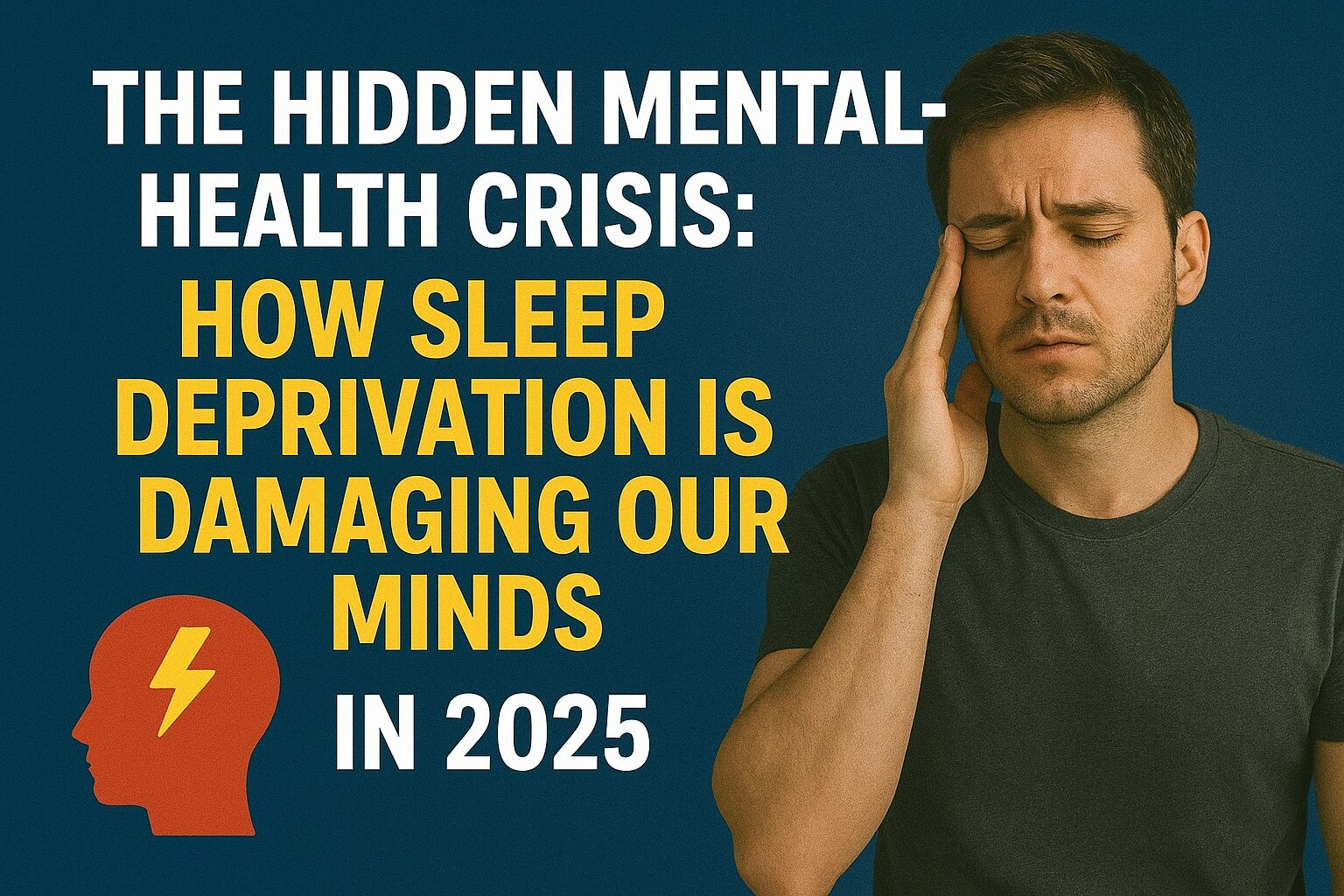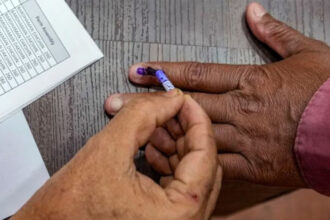Sleep has become a luxury in 2025. In a world driven by 24-hour connectivity, digital screens, and relentless work demands, millions of people are unknowingly trading rest for productivity — and paying a heavy mental-health price.
Recent studies link chronic sleep deprivation to anxiety, depression, and even early cognitive decline, calling it the “Silent Pandemic of the Modern Age.”
- 1. The Alarming Global Trend
- 2. Why Are We Sleeping Less in 2025?
- a. Digital Overload & Screen Addiction
- b. Hustle Culture & Remote Work
- c. Social Media Doom-Scrolling
- d. Stress & Overthinking
- e. Environmental Disruption
- 3. The Psychological Impact of Sleep Loss
- 4. Long-Term Risks of Chronic Sleep Deprivation
- 5. The Science of Restorative Sleep
- 6. Smart Sleep Solutions for 2025
- a. Digital Curfew
- b. Mindful Night Routines
- c. Sleep-Tech Innovations
- d. Nutrition & Natural Aids
- e. Cognitive Behavioral Therapy for Insomnia (CBT-I)
- 7. The Link Between Sleep & Mental Resilience
- 8. Expert Recommendations
- Conclusion
1. The Alarming Global Trend
According to a *2025 report by the World Health Organization (WHO), over *62% of adults worldwide fail to get the recommended 7–8 hours of sleep. In urban India, the number rises to 70%. Sleep researchers say that poor sleep is now as dangerous to mental health as smoking is to physical health.
Dr Arjun Sinha, neurologist at Apollo Hospitals, warns:
“People believe they can ‘catch up’ on sleep later. But the brain doesn’t work like that. Once chronic deprivation sets in, emotional and cognitive damage begins.”
2. Why Are We Sleeping Less in 2025?
a. Digital Overload & Screen Addiction
Smartphones, laptops, and smart TVs have extended screen time deep into the night. The blue light from screens suppresses melatonin — the hormone responsible for regulating sleep.
b. Hustle Culture & Remote Work
The post-pandemic world normalized working from bed. For many, there’s no longer a clear boundary between “office” and “home.” The result: disrupted circadian rhythms and late-night stress eating.
c. Social Media Doom-Scrolling
TikTok, Instagram Reels, and short-form video apps encourage endless scrolling. A single “scroll session” can stretch from 10 p.m. to 2 a.m. without realization — leading to chronic sleep debt.
d. Stress & Overthinking
Financial worries, relationship issues, and information overload keep the brain in high-alert mode, preventing deep restorative sleep.
e. Environmental Disruption
Urban noise, artificial lighting, and irregular meal timings have thrown off the body’s natural clock — known as the circadian rhythm.
3. The Psychological Impact of Sleep Loss
a. Mood Instability
Lack of sleep disrupts neurotransmitters like serotonin and dopamine. This causes irritability, anger, and mood swings. Even one night of poor sleep can raise emotional reactivity by 30%.
b. Anxiety and Depression
Chronic insomnia increases the risk of anxiety by 50% and depression by 70%. The brain’s emotional center, the amygdala, becomes overactive — while the prefrontal cortex (responsible for logic and decision-making) slows down.
c. Cognitive Decline
Sleep is when the brain “cleans” itself through the glymphatic system. Without proper rest, toxins build up, leading to memory lapses, confusion, and slower reaction time.
d. Reduced Creativity & Focus
Innovative thinking requires REM (dream) sleep. Cutting it short limits problem-solving skills and creative performance — especially in students and professionals.
4. Long-Term Risks of Chronic Sleep Deprivation
- Increased risk of Alzheimer’s and dementia
- Hormonal imbalance (affecting cortisol and insulin)
- Weight gain and impaired metabolism
- Cardiovascular issues due to elevated blood pressure
- Weakened immunity and faster aging
Sleep deprivation is no longer just about “feeling tired” — it’s a full-body and brain-level health crisis.
5. The Science of Restorative Sleep
Good sleep follows four essential stages:
1️⃣ Light Sleep
2️⃣ Deep Sleep
3️⃣ REM (Rapid Eye Movement)
4️⃣ Micro-Awakening
Each stage repairs different parts of the body and brain. Missing even one cycle disrupts emotional balance and learning ability.
Dr Meenakshi Iyer, sleep scientist at IIT-Delhi, explains:
“Your brain works like a cleaning crew at night. If you don’t let it finish the job, mental clutter builds up — and you wake up anxious and foggy.”
6. Smart Sleep Solutions for 2025
a. Digital Curfew
Turn off all screens at least 90 minutes before bedtime. Use blue-light filters or “night mode” to protect melatonin levels.
b. Mindful Night Routines
Reading, meditation, or journaling can reduce racing thoughts and signal the body to wind down.
c. Sleep-Tech Innovations
AI-powered devices like *Oura Rings, **SleepScore Apps, and *smart mattresses now monitor breathing, pulse, and REM cycles — offering insights into sleep quality.
d. Nutrition & Natural Aids
Foods rich in magnesium, tryptophan, and melatonin (like bananas, oats, almonds) help induce calmness. Herbal teas such as chamomile or lavender promote relaxation.
e. Cognitive Behavioral Therapy for Insomnia (CBT-I)
The most effective non-drug treatment for chronic insomnia, CBT-I retrains the mind and body for consistent rest.
7. The Link Between Sleep & Mental Resilience
Restorative sleep enhances emotional intelligence, empathy, and decision-making. Research shows well-rested people handle stress 40% better and exhibit stronger self-control.
When society values rest as much as productivity, burnout rates drop, relationships improve, and overall happiness rises.
8. Expert Recommendations
- Maintain a consistent bedtime — even on weekends.
- Avoid caffeine after 4 p.m.
- Keep the bedroom dark, cool, and quiet.
- Don’t use your bed for work or entertainment.
- Prioritize sleep as a daily habit, not a luxury.
Conclusion
Sleep deprivation is silently reshaping global mental health in 2025. The cost of lost sleep goes beyond fatigue — it drains focus, memory, and emotional stability. By prioritizing rest, practicing mindful habits, and leveraging sleep-tech wisely, we can restore balance to both brain and body.
“Sleep is not a waste of time,” says Dr Sinha. “It’s an investment in every waking moment that follows.”








